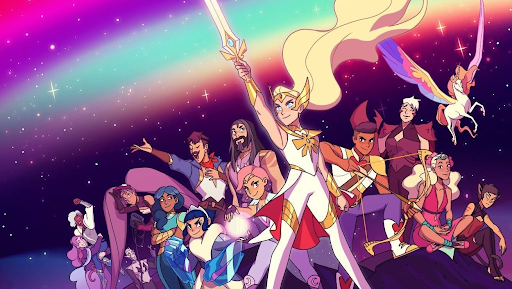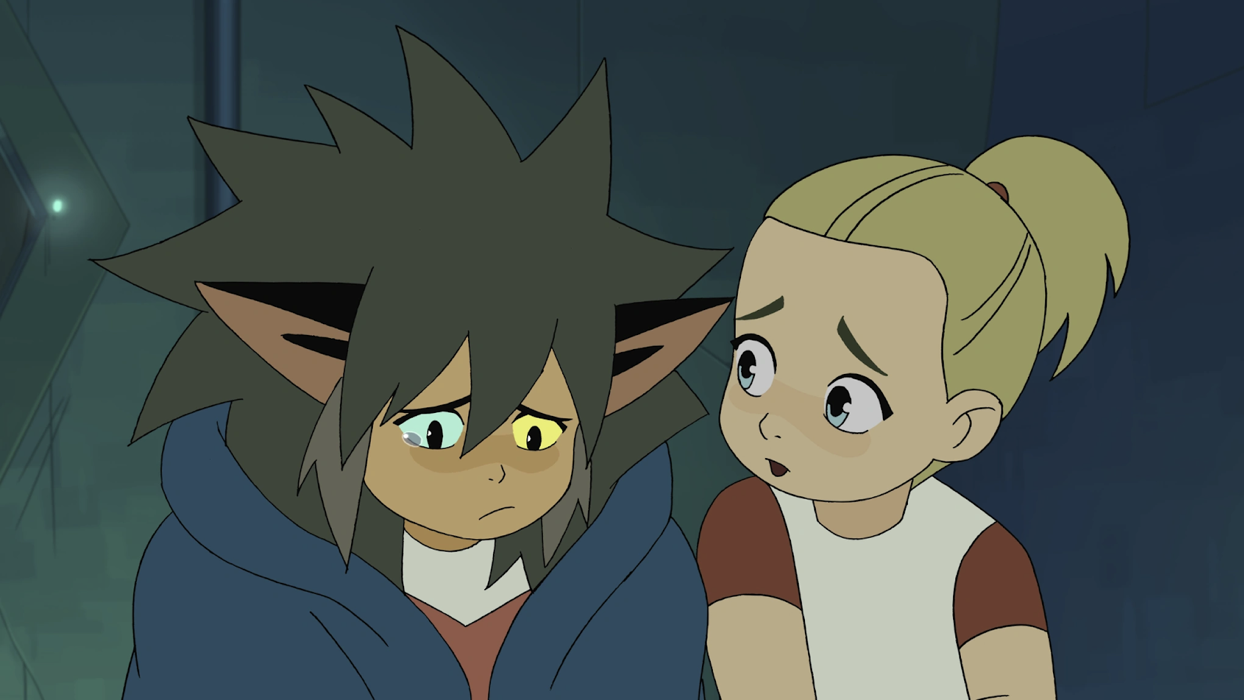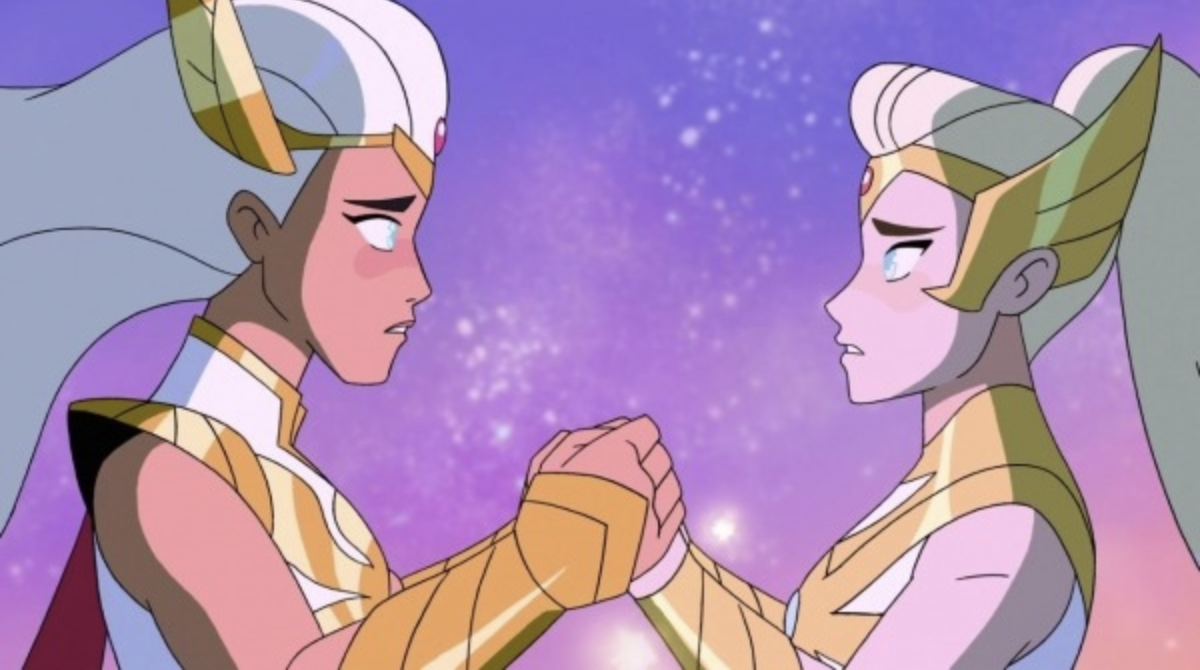How 'She-Ra and The Princesses of Power' Reminded Me That I'm Worth Loving
by Tofu
Spoiler Warning for the whole series!
TL;DR: I love this show and you should give it a try. It’s streaming on Netflix right now! What are you waiting for? Gogogo!
She-Ra and The Princesses of Power is a 2018 animated show that is special to many, including yours truly. Created by ND Stevenson (Nimona, Lumberjanes), it completely reimagines the original 80s She-Ra: Princess of Power and transcends any notion of it simply being a “remake” or “reboot”. The tale of a blonde girl and her cat best-friend-turned-enemy-turned-lover was groundbreaking in many aspects like LGBTQ+ representation and the successful reimagining of an archaic and somewhat problematic intellectual property. It’s a show that has resonated with me to the point where I’m willing to write about it. I’m sure the people around me are tired of hearing me yell about it, so instead they get to read about it.
What’s a “She-Ra” Anyways?
To quickly summarize if you haven’t watched the series (I’m flattered you’d read my rambles, but you should really go watch it) or just need a quick reminder, She-Ra and The Princesses of Power is a simple show on the surface. An evil army called the Horde is hellbent on conquering Etheria and is at war with the Rebellion. Adora and Catra, soldiers raised by the Horde, find themselves at a crossroad when Adora realizes that the Horde is evil and wants no part in it. With Adora joining the Rebellion and becoming She-Ra, Catra’s whole world is turned upside down which leads her to become Adora’s sworn enemy. The show uses the war as a backdrop to explore the intricacies of human relationships and conflict. Between the fun quips and the quirky dialogue, each character gets to grow, regress and grow again. They face their trauma and their inadequacies, attempting to carve their place in the world. With the power of love, friendship, and suffering — a lot of suffering, anything is possible!
Promise
The show starts off at a steady pace with the first season taking its time to present Etheria and introduce all the different characters and princesses. While enjoyable and fun, it wasn’t until Promise, the first season’s eleventh episode, that the show sank its claws into my cynical heart. All the pieces clicked together and I knew the show was going to be special. While mostly being a typical “flashback episode”, the show uses this tropey format to properly examine and dive deeply into Adora and Catra’s complex relationship. Two war orphans, forced to fight a battle they have no stakes in while fighting their own inner battles to find acceptance, to find purpose, and to be loved. The titular promise is naive and childish, exactly like the ones I would often make and hold onto in my formative years. Exactly like the ones that I’ve always wanted to believe in and still want to believe in.
“You look out for me, and I look out for you. Nothing really bad can happen as long as we have each other.”
“You promise?”
“I promise.”
When your life depends on the existence and approval of another person, a seemingly mundane promise can completely shape and warp how you view your place in the world. Catra was promised a life with Adora at her side and that’s what drove her. She endured gaslighting and abuse at the hand of the Horde and Shadow Weaver because she knew that Adora would have her back no matter what and that they would rule the Fright Zone together. Despite having her relationship with Adora used as a means to elevate Adora and punish her, she put up with it because of the promise. That is, until Adora finds the Sword of Protection and joins the Rebellion. That’s when Catra’s walls come tumbling down. The promise, the sole reason she put up with life’s tribulations, was broken. Maybe it was broken to begin with. The only thing resembling unconditional love was gone. Adora was gone. The years of trauma were all that she had left and she wasn’t going to let anyone betray her ever again.
Quite obviously, I am no war orphan and I sadly have yet to find my own best-friend-turned-enemy-turned-lover, but the promise spoke to me on a level very few things ever have. Catra’s inner demons were finally out and it’s no wonder she quickly became a fan favourite. Promise shows that these characters struggle and fight their inner demons. Watching Catra descend into madness and push everyone away hurts. As someone who has a tendency to mask their struggles and ball up to the point where they drive the people who matter away, I think it’s evident that Catra struck a chord with me.
Adora’s struggle as the “favourite” also starts to rear its ugly head and it is no less poignant and relatable. Being the “golden child” and the “chosen one”, her life was basically set for her. In the Fright Zone, she was a skilled soldier ready to climb the ranks and rule the Horde with Catra by her side. In the Rebellion, she is The She-Ra, Etheria’s hero and saviour. Between the constant fighting and doing what she’s told by “higher powers”, Adora rarely gets to choose. She has a role to play, but what role does she want to play? She constantly has to choose between doing what’s “right” or doing what’s “necessary”, but she never gets to do what she wants. When you live your life with expectations of perfection, anything less is seen as failure. The relationship one has with the expectations of peers, figures of authority, and most importantly themselves is toxic and can often lead to self-destruction. If you’re not perfect, then what are you? A burden.
That One Good Thing
Catra’s emotional journey is a rollercoaster towards self-destruction, where the highs are high and the lows hurt so very much to watch. There is nothing more painful than seeing her genuine smile be wiped away by the abuse she has to endure and her bad decisions (Something, something... Almost successfully destroying the entire known universe by opening an unstable portal). Healing takes time and it’s anything but a smooth ride. After a very bumpy journey, a broken Catra finally has the opportunity to carve a road towards redemption. In the final season, she decides to betray Horde Prime and help Glimmer escape, which could very much get her killed.
"I wanna do that one good thing in my life. Like you said. So...come with me!”
Anyone who has had a bout with their mental health knows that it’s a constant tug of war. The unhealthy, never-ending spiral it creates is a pendulum between healing and regressing. Far too often have I used my own shortcomings as an excuse to be stagnant. Why change for a world that is actively against me? Why better myself if the world isn’t better?
The one thing Catra held onto, the promise she made to herself, was that she would not apologize to anyone. However, to start properly healing, she has to let go. To start properly healing, she must break her own promise.
“Adora… I’m sorry! For everything!”
Recognizing your own shortcomings is the starting point, but it’s far from the end. It starts with accepting that you can be better. It takes an active effort to realize that you’re worth betterment. It will be difficult. It starts with picking yourself up. It starts with opening your eyes and realizing that you can change. It starts with doing that one good thing.
You Deserve Love Too
As the show swells into a crescendo in its two-parter finale, Heart parts 1 and 2, it aims straight for the heart (pun fully intended) and hits every single shot. A heartfelt message from Mara, the previous She-Ra, to Adora left me utterly broken and sobbing.
"You're worth more than what you can give to other people. You deserve love too."
Adora finally gets to hear someone tell her that she’s going to be okay. The weight of being expected to accomplish great things, to be a dependable best friend, to save the freaking world are finally lifted off her shoulders. Mara, a hero who sacrificed her life for people who have forgotten her, is telling Adora that she’s worth more than her actions. Everything that Adora had to give up, all the misunderstandings and hardships she went through, all the mistakes she made do not dictate her worth as a person. Adora didn’t become She-Ra. Adora isn’t She-Ra. She-Ra is Adora.
Maybe it was the realization that the show was coming to an end or the emotional buildup of seeing the characters I grew to love finally getting proper conclusions to their arcs. Maybe I’m just a sucker for epic music and sappy dialogue. It was probably all of the above. Whatever it was, I felt like the show “got me”. It was clear that the cast and crew understood the struggles of the characters they created and by extension, the struggles of their fans: normal everyday people who just want to be validated. I felt like it understood me. It was exactly what Adora needed to hear and exactly what I’ve always wanted to hear.
It might seem like a very cheesy and cliché line, but the show earned its right to use it and it works. It really, really works. I’ve struggled with self-confidence and general self-loathing for the longest time and seeing these larger-than-life characters with superpowers struggle in the same way and overcome their issues is nothing short of touching and inspiring. Behind Mara’s simple line is everything Adora and the rest of the characters have lived and suffered through. It’s their shared experiences and pain, their growth and redemption. It’s the culmination of what it means to be a flawed person and the relief that comes with understanding that being flawed doesn’t mean you need to be fixed. My flaws don’t mean that I need to be fixed.
In the end, despite everything, I’m still me, my own worst friend and my own best enemy.
In the end, despite everything, I deserve to be loved.
In the end, despite everything, you deserve love too.
We’re Gonna Win In The End
If you couldn’t tell by now, She-Ra and The Princesses of Power holds a very special place in my heart and I like it just a teeny tiny bit. I was late to the party, only watching the show at the end of the summer of 2021 and despite missing the initial hype, I cannot sing its praises enough. It’s easy to dismiss this simply as a “children’s cartoon” and overlook what it has to offer.
I mostly focused on cherry-picked moments of two major character arcs and how they resonated with me, but every character spoke to me in a way very few fictional characters have. Glimmer’s desire to grow up and be treated as an adult and an equal, Bow’s fear of revealing his true self, Entrapta’s struggle with social interaction and social norms as well as her hyperfixation on technology and science, Scorpia just wanting to be a bundle of joy and force of positivity in a world that actively promotes negativity, etc, etc. I’ve barely scratched the surface and could go on and on about how much I relate to these characters and how well crafted they are, but I’ll spare you… For now (Congratulations! You’ve made it this far. The suffering is almost over). I haven’t even mentioned the amazing music, the fantastic visuals, Catradora being canon, but I digress.
The purpose of this article was to shine a light on the power that fiction has and how much it can mean to real people. This show, despite its apparent simplicity, has helped me in a real way. It’s the only property for which I’ve ever written fanfiction. If that doesn’t prove how impactful it was, then I don’t know what will. It's really hard to wake up when you feel like everything is working against you and that you yourself are working against you, but the world is worth loving and you're worth loving too.




